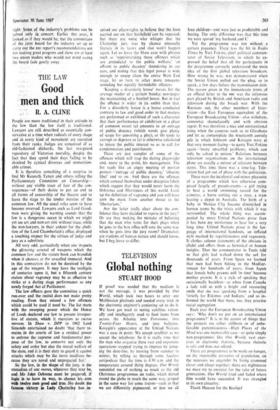Good men and thick
THE LAW R. A. CLINE
People are more traditional in their attitude to the law than the law itself, is traditional Lawyers are still described as essentially con- servative at, a time when radicals of every shape and in every kind of movement are recruited from their ranks. Judges are conceived of as old-fashioned diehards, the last rearguard repository of Victorian morality, despite the fact that they spend their days failing to lie shocked by cynical divorces and unmention- able crimes.
It is therefore something of a surprise to find Mr Kenneth Tynan and others telling' the Parliamentary Committee on Censorship— without any visible trace of fear of the con- sequences—of their desire to put an end to all forms of censorship of the theatre and to leave the stage to the tender mercies of the common law. All the usual roles seem to have become reversed. Lawyers such as Lord Good- man were giving the warning sounds that the law is a dangerous ocean in which we might yet see art and non-art sink without trace, while the non-lawyers, in their ardour for the aboli- tion of the Lord Chamberlain's office, displayed a touching respect for the virtues of judge and jury as a substitute.
All very odd, particularly when one inspects the glittering arsenal of weapons which the common law and the statute book can brandish when it chooses at the so-called immoral. And in this connection do not be deceived by the age of the weapon. It may have the verdigris of centuries upon it, but a fifteenth century statute about vagrancy may be as effective to strike at a daring stage performance as any newly forged Act of Parliament.
The law officers gave the committee a quick run-over and the recital does not make pretty reading. Even they missed a few offences which could be used if need be. The list starts with the sweeping power which the House of Lords declared our law to possess irrespec- tive of statute, which it exercises as custos morunt. In Shaw v. DPP in 1962 Lord Simonds entertained no doubt 'that there re- mains in the courts of law a residual power to enforce the supreme and fundamental pur- pose of the law, to conserve not only the safety and order but also the moral welfare of the state, and it is their duty to guard it against attacks which may be the more insidious be- cause they are novel and unprepared for.'
So the law, in the shape of the jury, is the custodian of our mores, whatever they may be, and Mr John Osborne must be prepared, if logic is to have its way, to chance his arm with twelve men good and true. No doubt the famous victory in Lady Chatterley has in- spired our playwrights to.believe that the, feats carried out on that battlefield-can be repeated; but there are some who whisper that the Chatterley jury was by chance unusually literary in its tastes and that won't happen again. Let us leave the Shaw case with phrases such as 'superintending those offences which are prejudicial to the public welfare,' an affront to public decency' thundering in our ears, and noting that this legal power is wide enough to sweep clean the entire West End stage, let us turn to other more innocent- sounding but equally formidable offences.
'Keeping a disorderly house' means for the average reader of a certain Sunday newspaper the maintaining of a brothel house. But in fact the offence is wider in its ambit than that. For a disorderly house is a house conducted contrary to law and good order in that matters are performed or exhibited of such a character that their performance or exhibition in a place of common resort (a) amounts to an outrage of public decency (which words give plenty of scope for censoring a play), or (b) tends to corrupt or deprave or (c) is otherwise calculated to injure the public interest so as to call for condemnation and punishment.
These are just samples of some of the offences which will trap the daring playwright and, more to the point, his management. The list reads like an angry meeting of puritan protest—'outrage of public decency; 'obscene libel' and so on. And there are the offences which conceal themselves under deceptive labels which suggest that they would never harm the Osbornes and Mortimers of this world. Look up the definition of vagrancy and you will have torn the mask from another threat to the 'libertarians.'
Are the latter really clear about the con- fidence they have decided to repose in the jury? Or are they making the mistake of believing that the man who votes for their plays when he goes to the box office will vote the same way when he goes into the jury room? Dramatists are students of human nature and should know, but I beg leave to differ.










































 Previous page
Previous page